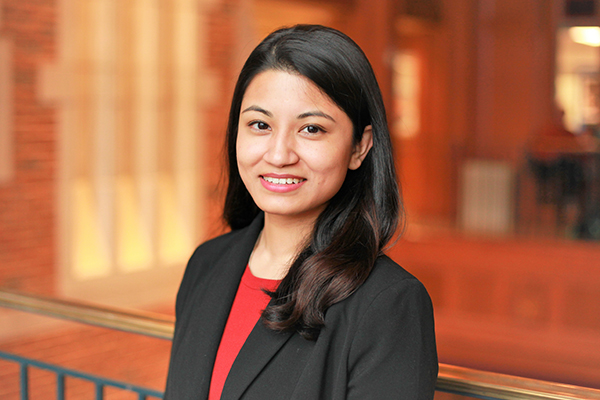Aahana Bajracharya
Imaging Science
Degree pursuing: PhD in imaging science
Hometown: Kathmandu, Nepal

Where did you complete your undergraduate degree?
Wesleyan College in Georgia
Please provide your lab and description of research.
I am co-mentored by Jonathan Peelle, associate professor of otolaryngology, and Joseph Culver, professor of radiology. My research focuses on developing computational approaches to mapping the neural bases of spoken language processing using neuroimaging methods such as high-density diffuse optical tomography (HD-DOT) and functional Magnetic Resonance Imaging (fMRI).
What played into your decision to get a graduate engineering degree?
My background in neuroscience and applied mathematics blended well to lead me to an engineering degree. I believe that an engineering degree equips me with the skills of designing and implementing novel approaches to understand brain function.
Why did you pick WashU?
The opportunity to perform interdisciplinary research attracted me to the imaging science doctoral program at WashU. It provides a solid foundation to the theoretical concepts behind imaging and an insight into the diverse applications of imaging modalities. I found the WashU community, students and faculty, to be very welcoming during my interview visit.
What was your favorite course and why?
"Mathematics of Imaging Science." It was a challenging course but was extremely helpful to set up a foundation for all the other courses that I took as part of the program.
What advice would you give to a new student?
Reach out to fellow students not just in your program, but also in other McKelvey Engineering programs. Having a network of friends will come in handy throughout your time at WashU. Do make use of office hours with course instructors.
What is your favorite thing about St. Louis?
Forest Park is one of the best things about St. Louis. It hosts a lot of fun events and is a great place to go for walks and runs.
What campus activities or groups would you recommend to a new student?
- Young Scientist Program (YSP)
- Brain Discovery
- Spectra (student chapter for SPIE and OSA)
- Departmental journal clubs/seminars
Are there any not-for-profit agencies that you have volunteered or worked with?
I volunteered with Biotechnology and Life Sciences Advising (BALSA) group, a student-led organization that focuses on biotechnology consulting.
What are your plans for the future?
I am interested in pursuing a career in the research and development of therapeutic approaches to cognitive disabilities.
